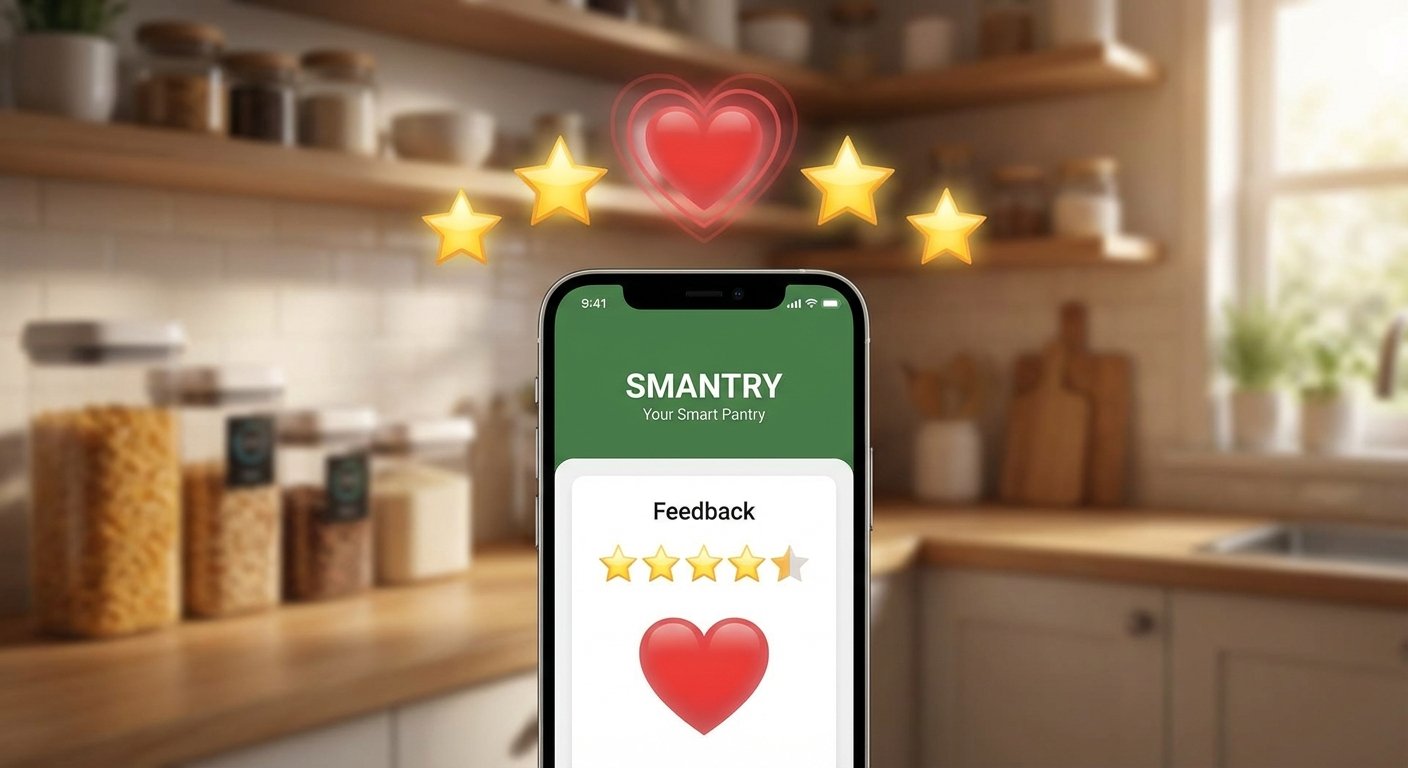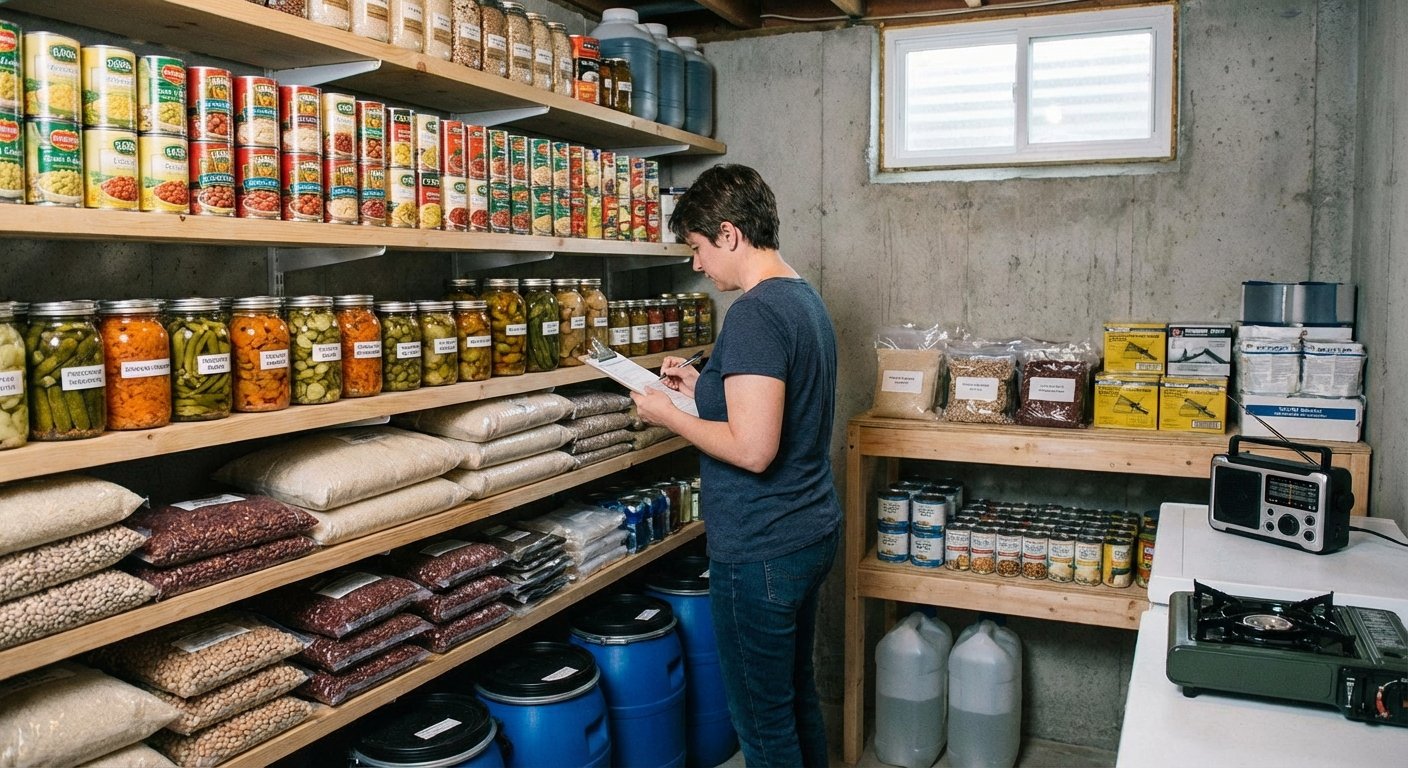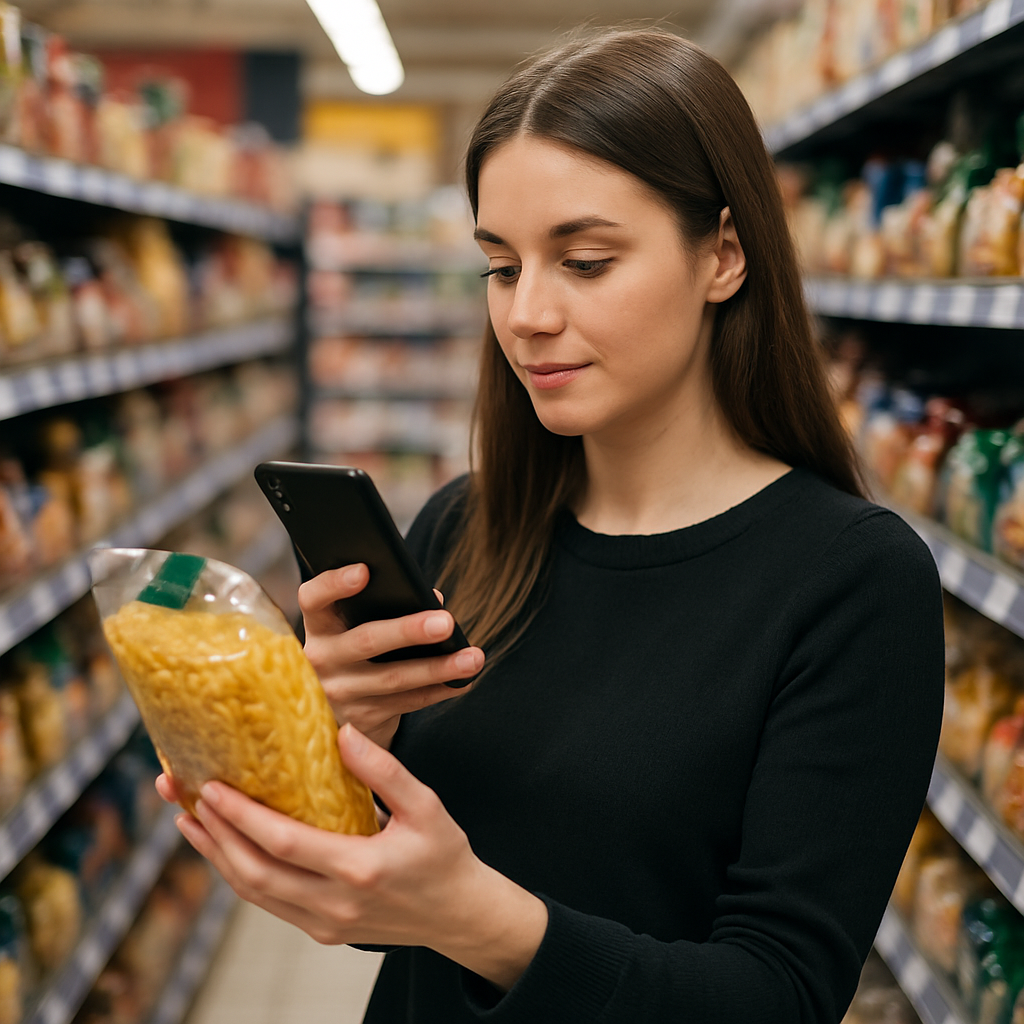5 tips for saving money when stocking up - plus bonus tip

Kira Zabe
October 1, 2024
Effective stockpiling is a great way to save money in everyday life. With a few simple strategies, you can reduce your household costs and at the same time ensure that you always have enough food or “everyday products”, as they say, at home. In this article, we share ten practical tips to help you become more efficient and cost-effective in your stockpiling. Whether it's through clever shopping lists, taking advantage of offers or storing food correctly, there are many different strategies you can use to save money. Here too, you don't have to slavishly follow our tips. Pick out what you can implement best or modify it so that it is feasible for you. Incidentally, I can say from my own experience that there are definitely advantages to having at least a few basic groceries at home. We've been a bit stressed over the last few weeks and thanks to our stockpile, we haven't had to go shopping every third day. Now, however, we urgently need to stock up again.
The good old shopping list
What's the saying? Good planning is half the battle. This also applies to shopping. Even if it's really annoying (at least that's how I feel), a shopping list only helps me to buy the things that we really need. Well, okay, every now and then I might take one or two products with me that I don't necessarily need, but this is about progress and not perfection. Before you start writing your shopping list, you should at least think roughly about what you want to cook this week. Of course, this will then go on the shopping list. By the way: TheSmantry.appalso has a shopping list function 😉
Plan bulk purchases
This point is actually relatively easy to implement for singles too, because bulk shopping doesn't mean that you have to buy 5 shopping carts full or more, as you often see in documentaries. You should take advantage of offers, even if you are single. Dry foods such as rice, pasta and oatmeal feel like they will keep forever. However, keep the size of your storage facility in mind. After all, it's no use if you suddenly have 20 packs of pasta from the special offer at home but no way to store them. Make sure you use older supplies first to avoid waste from expired food. In the Smantry.app, you can enter the best-before date of the products and assign a storage location.
Private label instead of branded product
Another tip for saving money are the supermarkets' and discounters' own brands, which are often cheaper than branded products and still have good quality. Incidentally, many of these own brands are backed by well-known manufacturers. Private labels are therefore not of inferior quality, as many brand fetishists argue. If you don't necessarily want to process your fruit and vegetables fresh, then the frozen variety can be the solution, at least in some cases. Frozen food is often cheaper and, above all, has a longer shelf life.
Grow your own
Of course, not all of us have a garden and/or a huge terrace or balcony. But even in a few pots on the windowsill, you can grow herbs, for example. The classic home-grown crop is probably tomatoes. If your thumbs aren't quite as green (like mine), you can buy pre-grown young plants. A south-facing balcony would be ideal, as tomato plants are very sensitive to the cold, which is why they should only be put outside in May after the Ice Saints. You can grow almost all tomato plants in containers, but you should make sure there is enough space between the individual plants.

Buy local and seasonal
This tip is “old but gold” and actually quite logical. Food that has to travel long distances before it ends up on our plates is generally more expensive than food that has been produced locally. One of the reasons for this is the shorter transportation routes. This not only reduces direct logistics costs, but also indirect costs such as packaging, storage and handling. Conversely, shorter transportation routes also mean lower CO₂ emissions. So if you buy locally, you are also doing something for the climate. In addition, locally produced food often produces less packaging waste. Of course, not everyone has the opportunity to shop locally at a weekly market or the farm store around the corner. Organic markets usually also offer regionally produced food where possible. You can now even find regional products in many discount stores and supermarkets. There are now also many vending machines offering regional products.
Bonus tip: Don't feel guilty
Organic products are of course still more expensive than products from industrial production, whether they are regional or have a better carbon footprint. Not everyone can afford to buy only organic products. So don't feel guilty if you don't just buy food from the farm around the corner. Personally, I firmly believe that it's the mix that makes the difference. Maybe you can swap a conventionally produced product for an organic product every now and then.

Smantry: Not perfect – but made with a lot of heart
Many of our users write to us that theyhave been looking for exactly this kind of app for a long time. At the same time, we also read reviews that say:“Good idea, but …”
And that’s exactly what we want to talk about openly today.
An app for everyday life – not for perfection
Smantry is designed to make everyday life easier: manage groceries, stay on top of things, waste less.
Your feedback shows us that this is already working well for many of you:
- Inputs are quick and straightforward
- The scanner reliably detects most products
- Editing and making changes is easy
- Our support is perceived as fast, friendly, and solution-oriented
We’re really glad to hear that – because that’s exactly what we’re building Smantry for.
Why some things are (still) not perfect
What you often don’t see from the outside: Smantry is developed by a very small team.
Right now we are 5 people, and none of us works full-time on the app. We do this alongside other projects, jobs, and commitments – with a lot of passion, but limited resources.
That doesn’t explain everything, but it provides context:
- Some functions take longer
- Technical issues (e.g. with premium activations) unfortunately happen sometimes
- Not every idea can be implemented right away
Frequently asked questions from your reviews
Why a subscription?
The subscription allows us to cover server costs, ongoing development, updates, and support in the first place. Without continuous revenue, Smantry would not be able to exist in the long term.
"Why isn’t the bug I reported being fixed?"
Sometimes there are several bugs at the same time and we have to prioritize the ones that affect core functions. That can mean that a different bug gets fixed first. We always try to resolve everything quickly – but unfortunately we can only do it step by step.
Why doesn’t Premium sometimes work right away?
Subscriptions are managed through the app stores. In rare cases, synchronization issues can occur. That’s annoying, but not intentional – our support team will always help you with this personally.
Where we want to go
Smantry is meant to get better – not just on paper, but in real everyday life.
This includes:
- more features from the web app
- better stability
- more flexibility with categories
- clearer communication
Your feedback plays a central role in this.
In conclusion
We’re not a corporation.
We’re a small team that believes in a good idea and is putting it into practice step by step.
If Smantry is helping you – even if everything isn’t perfect yet – we really appreciate your trust, your feedback, and of course a fair rating in the App Store 💛
Thank you for being part of this development.

Power outage in Berlin: Why preparation and prepping are more important today than ever
An unexpected power outage in Berlin has recently shown how quickly our daily life can become unbalanced. Traffic lights went out, card payments stopped working, and many households were suddenly without light, internet, or cooking facilities. Such events highlight: emergency preparedness and prepping are not about spreading panic, but rather a sensible and responsible preparation for real risks.
Power Outage – A Real Risk for Major Cities
Whether it's technical malfunctions, construction work, or extreme weather conditions: A Blackout or regional power outage can occur at any time. Especially in large cities like Berlin, the effects are immediately noticeable. Without electricity, many basic systems no longer function – from supermarkets to ATMs to communication.
The most important question is:
Am I prepared for this?
Prepping: Preparedness instead of fear
Prepping does not mean preparing for apocalyptic scenarios. Rather, it's about everyday readiness:
- remain capable of acting
- be able to provide for the family
- Reduce stress and uncertainty
- not be immediately dependent on external help
The power outage in Berlin demonstrates: Just a few hours without electricity can cause major problems.
Stockpiling food as a key to emergency preparedness
A well-thought-out food supply is the foundation of any emergency preparedness. Experts recommend having supplies for at least 7 to 14 days. These include:
- non-perishable food items such as rice, pasta, canned goods
- Drinking water
- long shelf-life snacks
- Baby food or special diet
- off-grid cooking options (e.g., gas stoves)
Yet many households quickly lose track: What's available? What's missing? What's about to expire?
Digital preparation with the Smantry App
Here comes the Smantry App into play – your digital companion for prepping, preparation, and stockpiling. The app helps you to plan your supplies in a structured way and to keep track at all times.
With the Smantry App you can:
- Easily capture food supplies digitally
- Define minimum quantities for emergencies
- Monitor expiration dates and prevent food waste
- prepare specifically for power outages, blackouts, and crises
- Integrating prepping step by step into daily life
This makes emergency preparedness simple, transparent, and efficient.
Prepare now instead of improvising later:
👉 Download the Smantry App and start your digital emergency preparedness today.
Power outage in Berlin as a wake-up call
The power outage in Berlin was an eye-opener for many people. It demonstrates how quickly familiar structures can collapse – and how important it is to be prepared. Those who take precautions in time remain calm, safe, and independent.
Conclusion: Take precautions now instead of reacting later
Power outages, supply shortages, and crises are part of the reality of our time. With a well-thought-out food stockpiling and digital tools like the Smantry App you can make your emergency preparedness simple and effective.
👉 Start your preparation now
Download the Smantry App and gradually build up your personal emergency preparedness – before the next power outage occurs.
Discover the app now and be prepared.

🍂 Cozy Autumn Leftover Cooking – Comfort dishes made from what's available
When the rain taps on the window and the tea cup becomes a permanent guest, the most beautiful kitchen time of the year begins: autumn. And what could be a better match than stylish leftover cooking – dishes that are not only sustainable but also truly exciting.
Autumn leftover cooking means: use instead of waste, but with a touch of sophistication. Here are some more unusual ideas to turn leftovers into small culinary highlights.
🧀 1. Pumpkin Gnocchi from leftover roasted vegetables
Do you have some leftover roasted pumpkin or sweet potato from the day before? Perfect!
Mash the vegetables, mix them with some flour, salt, and grated Parmesan, shape them into small gnocchi, and briefly cook them in salted water until they float to the surface. Then toss them in sage butter and top with chopped walnuts.
→ Tastes like Italy, looks like fine dining – and it's all made from leftovers!
🥖 2. Rustic bread salad with grapes and goat cheese
Tear stale bread into pieces, toast in olive oil until golden brown.
Add a few grapes (wrinkled ones are especially sweet), arugula or lamb's lettuce, crumbled goat cheese, and roasted hazelnuts. Mix with a dressing of balsamic vinegar, honey, and mustard.
→ A fall twist on the classic Panzanella – sweet, salty, crunchy, perfect!
🧅 3. French onion tart with leftover vegetables and puff pastry
Got some leftover puff pastry in the fridge? Make a tart out of it!
Caramelize onions in butter, add some leftover vegetables (e.g., leeks, mushrooms, or spinach). Spread on the pastry, top with a dollop of sour cream or cream cheese, and bake until golden brown.
→ Wonderfully aromatic, especially with thyme or rosemary.
🍎 4. Apple Sourdough French Toast with Vanilla Rum Butter
A piece of stale sourdough bread is soaked in a mixture of milk, egg, vanilla, and a dash of rum, fried in a pan, and served with fried apple slices and a rum butter.
→ Luxurious, yet made entirely from leftovers – perfect for a Sunday breakfast in pajamas.
🥬 5. Risotto made from leftover vegetables with lemon and herb oil
Chop the vegetable scraps finely and cook with a handful of rice into a creamy risotto.
A dash of lemon juice and some leftover herbs (parsley, basil, arugula) blended with oil make a fresh herb oil as a topping.
→ The acidity of the lemon beautifully enhances the earthy autumnal notes.
☕️ Bonus Tip: Using leftovers in a dessert glass
A few spoons of leftover compote?
Some leftover cake or cookies?
Layer it all with yogurt or mascarpone in a glass – and you have an autumnal "trifle" that looks like it came straight from a café in Copenhagen.
🍁 Conclusion
Autumnal leftover cooking is not a last resort, but a playground for creativity. When you look at ingredients with open eyes – not as leftovers, but as opportunities – small, exquisite dishes full of soul and flavor emerge.

Why we never stop refining Smantry ✨
At Smantry, we don't believe in 'finished'.
An app that is meant to accompany people in their daily lives is never complete – it grows, changes, and evolves. Just like the people who use it. 💛
We regularly pay attention to every detail:
How does a click feel? Is the path to a function clear enough? Does the idea behind a new view come across intuitively?
Sometimes it's just tiny things that make the difference – a better-placed button, a simplified overview, or a sentence that suddenly becomes clearer.
What drives us is the idea that Smantry should feel easy, familiar, and meaningful.
We want you to open the app and feel: "Ah, this is exactly how it should work."
Of course, not everything always goes perfectly. But that's exactly the point: We take the time to listen, to observe, to reconsider. Every piece of feedback, every use case, every new idea helps us to understand a little better what really matters.
Smantry is not a rigid product for us – it's a living process. A collaborative project that grows step by step.
And every update, every small improvement is a sign that we are on the right track:
A path to an app that doesn't feel like technology, but like support.
Towards a daily life that becomes simpler. Towards clarity, structure – and maybe even a bit of ease. 🌿
We're staying on it.
Because we are convinced that good things take time – and that it's worth creating them with heart.
Your
Smantry-Team
